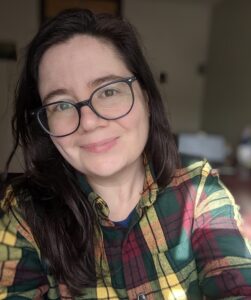I love you pandemic o sweet sweet pandemic. I love you new flu I love you flattening the curve I love you doors closed people inside families hidden from view. I love you whatever it is that brings Eva and me to each other’s mouths finally and our shaking panting wanting. Like dogs, I want to say—but that would ruin it.
The white tulips Eva brought home from our monster grocery run are shedding their petals on the kitchen table. It’s Wednesday morning and we’ve only now stopped fucking and kissing because Eva has a case brief to prepare. Unlike most of the world, it seems, law students can’t slow down. I bring refills of coffee and toast crowned with the French jam she likes to the living area, where she sits on the teal armchair she brought when she moved in. A “womb chair” she calls it, and could that be because it’s the perfect size for her, and she’s cupped and secure inside its strange regal breast like an infant, her round thighs just kissing the sides?
I open my laptop even though my cell phone has once again confirmed that no one from the office expects me to do anything. I sit across from Eva, who’s now cradled in that womb and the yolk-yellow sunlight that pours through the windows. I try to imitate her industriousness, clicking around the screen. The remote desktop program my office uses makes everything smaller and I don’t know how to fix it, my eyes straining to re-read emails and double-check the budget I’ve prepared for our Revitalize Spring! campaign for local downtown businesses, which was supposed to start in a few weeks. Everything we’ve ordered and planned for April— lavender-and-lemon-coloured pamphlets and signs, radio spots, hashtags, a new website—is waiting on my desktop at the office.
Nothing is quite real yet, and of course as I think this I have to think of the pandemic, too. However real it might be for us has yet to be decided. But mostly, I’m thinking of the hashtags yet to be christened on social media, the website not yet launched, the radio spots not yet played, and the signs primed to be printed. The whole campaign is like a hibernating bear waiting for winter to end. All we have ready are the pamphlets, which we’ve decided look cheap and dated. We aren’t sure we want to use them, though we think some of the older shopowners downtown might appreciate something they can hold in their hands, something glossy and smooth that doesn’t just exist on a screen.
By “we” I mean “me,” because this is the first campaign I’ve led since starting in the office nine months ago, the first time I’ve needed to make the final decisions. The campaign felt like everything to me a week ago but now it feels like nothing, and instead of working I keep the corners of my eyes fixed on Eva’s legs, folded in some holy gesture across the room.
I make us grilled cheese sandwiches and a big salad for lunch. She puts down her laptop with a smile and reaches for the plate, then gestures for me to sit next to her. I crouch awkwardly, half-on and half-off the womb. My longer hair tangles in hers and together, our waves look like a sea plant. I kiss her cheek and move to sit by her feet with my own plate on my lap, her penitent student.
Eva works all afternoon, her eyes barely leaving the screen. At five, she closes her laptop and winks at me, gliding into the kitchen area of our apartment’s living space without a word. I watch her waltz around, piling eggs, potatoes, onions, cheese, tomatoes, carrots, and parsley on the counter. She hums and for a minute looks a bit like my mother, but happier, less faded. Without glancing at her phone or opening one of the large white hardcover books she has lined on the floating pine shelf, she delivers a crisp Spanish omelette in a cast iron pan, roasted maple carrots, and a cherry tomato salad. After dinner, she works her fingers into me until I forget our names.
The brief is due by the end of the week. Eva works all day the next two days, and then uploads it shortly after eleven PM on Friday. We toast her team’s success with the whiskey Eric brought me at Christmas. Eva wasn’t there—she went home for the holidays. We weren’t close then, weren’t anything more than roommates, until this past week when everything happened so quickly.
Eric is the next best thing to family I have in this city, better than my own family, in most ways. He also made a great stand-in date at my office Christmas party. He came over early and watched me straighten my hair in the bathroom, sitting on the edge of the tub and faux-yawning when I told him he could be out at the party but I couldn’t. He gave me a look like I was ridiculous, but when we walked into the reception hall, he snuck an arm around my waist, left it there the whole night. He spent the evening introducing himself as my “special someone,” getting drunker and drunker and kissing the side of my face like our plane was going down. I was pissed because there’s a woman at work I thought I had a chance with for a while. I’d been trying for months to find a way to signal to her that I was game without letting the whole office know. Too soon, I figured.
Around one AM, after the party started to wane, I drove us home and Eric passed out on the couch. In the morning he was apologetic, and I forgave him, because where would I be without him, anyway?
By the time Eva and I untangle ourselves from her bedsheets on Saturday it’s almost noon. Like some sort of fucking cosmic joke, the coffee maker isn’t working, so she takes down the French press her mother gave her for Christmas and opens the box, unfolding the directions in front of her like a tourist map.
Eric gave me one just like it a couple years ago that I cracked, and so I take this pristine French press from her and show her. Dead simple. Our coffee is ground too fine and it pours out grainy, almost like silt, but she says she likes it anyway.
Eva’s been avoiding the news, and I try to do the same. My mother’s called twice but I haven’t answered. I listen to the voicemail when I’m on the toilet. She sounds puzzled but not panicked. I’m sure you have everything you need, she says in her practical way. I can see her at the stove, flipping my father’s pancakes or preparing tea for my grandmother, who has lived with them for the past four years.
Sunday morning, I mention to Eva that we’ll have to get more groceries eventually, and she tells me she isn’t worried. She disappears into her bedroom and comes back with an armful of plastic freezer bags. Some are stuffed with medical masks, the others with tiny bottles of hand sanitizer. Her laugh swells in the room.
Your face!
I try to shift my shock to a smile.
My mother does this, she explains. She always has. If we run out, she’ll send more in the mail—she has a whole room of disaster stuff in the basement.
I feel lucky and safe, like nothing can touch us. This isn’t just the first time I’ve felt this way since we started isolating, it’s the first time I’ve felt this way in years.
Eva spends half of our second pandemic Monday on the balcony wrapped in an oversized grey cardigan, eyes on the harbour, earbuds in as she calls her group partners to strategize for the next mock brief they have to prepare. Leaning over the railing with her back to me, her long legs crossed at the ankles, she looks like she stepped out of a music video.
I text Eric to see if he wants to chat but he doesn’t respond. I draft some copy for the office, my fingers tripping over the keys of my laptop. I have to stop so many times I eventually give up. The emojis I thumb to Eric—bananas, eggplants, stars, and hearts—unravel like a digital friendship bracelet over my cell phone screen. I try not to worry when they go unanswered.
Just before midnight, Eva steps softly into my room, pulls back the comforter and climbs in next to me. She wears a grey tee shirt and black panties. The novel I’ve been trying to read falls to the floor with a thud.
Eva is the first person to teach me as much as Eric has. She grew up with music lessons and even had her own flute, bought brand new when she was eight. She’s from Calgary, and while she says the city is too ugly to bear, it sounds like a great place to be a kid. The way she describes it, I picture a sea of clean roads bordered by large, modern houses, rippling turquoise pools like crown jewels, one for every backyard.
Eva explains the law to me in a calm voice, the same way she explains cooking, wine, and fabrics. Before the last couple of weeks, before I ever thought we’d sleep together, before I knew she was queer, she taught me how to iron my pants for work, how to get them completely flat save for a visible crease down the front. Next time, try wool. Natural fibres are what you want to invest in. It felt like nothing at the time, but when I think of her hands over the fabric now, my face gets hot.
The last time I spent this much time in so close to another person was over the holidays, with Eric. It wasn’t our first Christmas together. I lived alone for my fourth year of undergrad, in a small bachelor near campus. I had come out that summer and my roommate Alison said it was fine. The next week, she told me she wanted to live alone. It was too late for me to find a roommate—Eric and I still spent all our spare time together, so it’s not like I was making any other friends, not that I needed to—so I found the bachelor and moved in and didn’t look back. Neither did Alison, it would seem, because she never called and from then on only texted when she was drunk, emojis and punctuation, no words.
That December, I knew I couldn’t go home for Christmas, dressed up as a lie I was trying so hard to shake. My mother didn’t press when I called to say I wanted to stay in the city. I told her I had to focus on preparing for my last semester. She said to call on Christmas Eve so I could talk to my father and grandmother. I promised but ended up putting off the call until Boxing Day.
Eric hadn’t gone home for the holidays in years. He’s from one of those big Catholic families in Cape Breton and says it isn’t worth his time trying to act straight around people he doesn’t even like. The night after my last exam, he came to my place the night with falafels and a bottle of red wine. We spent the evening watching Cheers on my laptop, falling asleep in my bed together, back to back. He stayed the whole week and got us a tree, a real one that barely fit in the room, and we decorated it with microwave popcorn strung onto dental floss. He taught me how to make carbonara and I taught him how to knit, a long skinny scarf in plain garter stitch made with scratchy pink yarn I’d found stashed in my closet. We got drunk on rum and store-bought eggnog on Christmas Eve and he took me to midnight mass, where we stood at the back of the cathedral smirking, Eric narrating the whole thing under his breath, but then taking communion anyway.
This year was different. The condo Eva and I share is big enough to be a real home, so it didn’t feel like a joke but like an actual celebration. In addition to a bottle of Japanese whiskey, Eric brought multiple bottles of wine, a pre-stuffed turkey, presents that looked like they had been wrapped in a store, and shopping bags full of fancy nut trays and foreign cheeses. When he realized I didn’t have a proper cheese board he went out on the morning of Christmas Eve to buy one. I used the time to hastily wrap some books from my shelf in old fliers.
I’d never seen Eric spend that way. He doesn’t trust extravagance, though he’s not cheap. He always pays when we hang out, just like we did the first summer we knew each other, when I worked part-time for him. That’s when I started making the money that would keep me from getting evicted or entirely drowning in debt or being forced to move home without finishing school. I’ll still have loans for years, but with the degree and the new job and the clothes I could afford to buy at the last minute before seeing the apartment, along with the promise that I would attract a similarly respectable young woman—another professional or someone like Eva, a second-year law student who is so used to money she never bothers to think about it—as a roommate, I felt a security in my life for the first time, like I had a glimpse of the way the landlord would see me, and it wasn’t embarrassing. It wasn’t a feeling I trusted. It still isn’t. The security isn’t inside me, in my heart or my bones or my blood or even in my brain. It’s more like an expensive coat, something I put on when I go out in the morning, a trick others believe more than I do. And that’s what Eric gave me.
Eric stayed over the holidays until New Year’s Day. He slept on the couch the whole time, though I told him I was fine with him in my bed. He shook his head and kept making jokes about being too old for me, like the possibility would have been there otherwise. While there was a coziness and a satisfaction in having him there, and in having some luxury around us, my stomach tightened when our conversations came to a lull, like they did the first summer we drove around in his van, selling clothes. The more fun we had and the closer we got, the more there would be to lose.
Eva works and I waste time. I try making Eric’s carbonara one night while she reads in the womb. She wears a very round pair of rimless glasses and looks so sexy I can’t believe my good luck. To my surprise, the carbonara turns out okay and she pauses to eat with me, though the look in her eyes tells me she’s distracted.
I’m worried about Eric, I say when the conversation has slowed. I haven’t been hearing from him.
He’s probably busy, she shrugs. Does he live with someone?
I’ve mentioned Eric to her before, though we’ve never talked about him at length. We never talked much at all until we were shut up in the apartment together.
I tell her Eric lives alone.
Well, I’m sure he’s fine. How many cases are there in Nova Scotia? she asks. Or Canada even?
As much as I’ve tried to ignore the news, I know there are cases here already. They’ve closed the schools. When I walk around outside things are still and silent, even downtown. In her distraction, Eva hasn’t felt the way the world has changed.
It’s not about COVID, I say, though immediately I wonder if I mean it. I’m worried about his work. Eric doesn’t have a regular paycheque or an office. He’s resourceful, but no one in his situation could have been prepared for this.
After dinner, Eva goes back to studying and I leave the building. I don’t want her to hear me make the call.
He doesn’t pick up, so I walk along the harbourfront. It’s dark and cold but dry. I zip my coat up higher and walk faster. I pass by a few others walking by themselves. We let the space between us widen, though we smile at each other.
I find a bench to sit on and dig out my phone. Eric’s called back but I missed it. “Don’t worry” reads the first text I’ve seen from him in days. I call anyway.
You okay? I ask when he answers. I hear a short laugh.
Glad someone cares.
Seriously, where have you been?
I went up to Cape Breton when the news broke.
What?
I can almost hear him shake his head at me. Christ, Maddie. Are you okay?
I’m fine.
I figured. You have that roommate, right?
I swallow and tell him the news.
Wow, he offers. Girl, I’m proud. Despite his words, his voice is heavy.
I really like her, I whisper. My face cracks into a grin.
What?
I said, I like her, I repeat, raising my voice above the wind this time.
Well, hey, glad this thing is working out for someone.
You went home to take care of your parents?
Yeah. His voice comes slow now. It’s just my mom.
Oh.
My dad had a heart attack in January. Just after New Year’s.
Oh, shit. The words feel useless. I’m so sorry. I didn’t know.
I didn’t see why anyone else had to feel bad about it.
It’s okay then, with your mom?
It’s strange. His voice sinks into me as I stare at the ocean, dark and glistening. I shiver.
You’re okay, though?
Actually, this seems like a really great place to ride things out. I barely need to spend money up here, and she needs me.
I nod, then realize he can’t see me.
Good point.
I have a place to stay, he continues. And she’s easy. If I can just remember to buy the right kind of tea, we’re good.
She must like having you there.
I think so.
Well, I would.
Eric sighs. I worry I sound jealous.
I just mean—
Look, he interrupts. I should have told you I was heading out of town. I’m sorry.
I nod. Tears slide down my face. I wipe then so they don’t freeze on my cheeks.
You can call me, he continues. And I’ll call you. I shouldn’t have been so distant.
As long as you’re okay, I say.
Yeah. Same to you.
It felt too selfish and absurd to say it, but at that moment, I wanted to tell Eric I really needed him. I could picture him up there, staying in his mother’s house, coordinating grocery runs with all the brothers he has in town. Watching her small TV and smoking cigarettes outside. Waiting out whatever it was we were living through.
Knowing Eric was with another kind of family than the one we had built together makes me feel lonely. We never said the words, but I thought he understood.
I stay down by the water after we hang up. Eventually Eva starts texting.
I walk back to the apartment. Inside, Eva pours me a glass of Malbec and sits down with me on the couch. She puts a hand on my knee and I think of my mother again, the way she’ll touch my father so lightly around the house. The years have taken a lot away from my family, as they do to all families, but there are still those small gestures my mother is able to muster. I think of my father as a lost cause, though he buys the requisite flowers for their anniversary and Valentine’s Day. Grocery store arrangements, but still.
I look at Eva, no longer distracted by the brief or her group partners. This is what’s nice about it—being home with her, able to focus, the world just slightly quieter around us. Like those dimmer switches that allow you to dial down the light somewhat. It’s the feeling of being home with your family in those odd moments where no one is truly mad at anyone else. When no one is cheating, or lying, or getting divorced, or staying so silently still and sad inside themselves that everyone else can feel it. When no one has cancer or is unemployed. Like those Christmases with Eric. I can have that with Eva now, in this slightest, most promising gap in time when no one at work knows how to proceed and I’m not being called anywhere. There’s no chance to disappoint anyone I love, no risk of resentment.
I make a mental note to order her a bouquet as soon as possible, praying that the flower stores won’t stay closed forever. And then I kiss her.
 Annick MacAskill is the author of three poetry collections, including Shadow Blight, winner of the Governor General’s Award. Her fourth book of poetry will be published by Gaspereau Press in 2024. Her fiction has previously appeared or is forthcoming in journals including Canthius and The Temz Review. She lives in Kjipuktuk (Halifax), in Mi’kma’ki.
Annick MacAskill is the author of three poetry collections, including Shadow Blight, winner of the Governor General’s Award. Her fourth book of poetry will be published by Gaspereau Press in 2024. Her fiction has previously appeared or is forthcoming in journals including Canthius and The Temz Review. She lives in Kjipuktuk (Halifax), in Mi’kma’ki.






